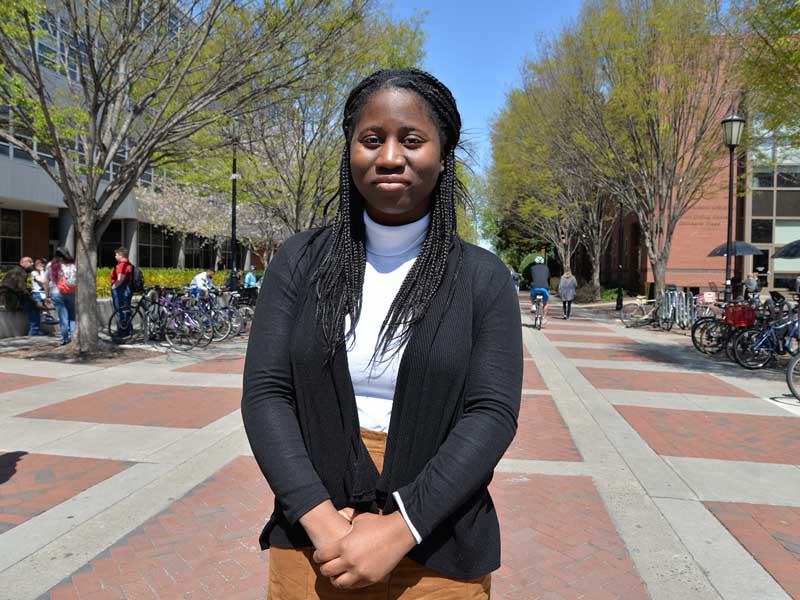Between 2015 and 2017, 624 million insecticide-treated mosquito nets were distributed, mostly for free, to reduce malaria, severe disease and death in regions of the world where malaria is endemic.
The nets, which serve as a protective barrier for the people sleeping under them, have been proven to help prevent the spread of malaria, a disease that saw 219 million cases and 435,000 deaths in 2017, according to the World Health Organization.
Yet research shows that households that own insecticide-treated nets, often referred to as ITNs, do not always use them.
This summer, Virginia Commonwealth University student Sarah Yankson, a junior in the Department of Psychology in the College of Humanities and Sciences, will travel to Ghana to work on a pilot study investigating sleep quality under insecticide-treated nets, which could help explain why Ghanaians do not consistently use them.
“The study will test whether carbon dioxide levels increase [under] ITNs during sleep,” Yankson said. “If this is found to be the case, it might explain reported discomfort by ITN users.”
Yankson is one of a dozen students in the College of Humanities and Sciences who are among the second round of recipients of awards from the Baldacci Student Experiential Learning Fund. The fund provides grants of $1,000 to $5,000 to academically promising VCU students from diverse areas of study and backgrounds to allow them to pursue internships, conferences, research, domestic or international study abroad, and social entrepreneurship opportunities.
The fund, made possible from a gift to VCU from best-selling novelist and political science alumnus David Baldacci and his wife, Michelle, in fall 2016, is open to rising juniors and seniors whose primary major is in the College of Humanities and Sciences.
In addition to Yankson, this year’s Baldacci recipients include students who will conduct research on childhood malnutrition in Guatemala; study abroad in Spain; present research at a zooarchaeology conference in California; travel to Tanzania, Uganda and Rwanda to study democracy and development; and research the effects, if any, that female ornamentation (i.e. elaborate coloring) has on mating choices by prothonotary warblers along the James River.
“We can clearly see from the scholars and the wider applicant pool a deep yearning to explore the world outside their classroom window,” said Sarah Golding, Ph.D., assistant professor in the Department of Biology and special assistant to the dean for experiential learning. “Whether it be by studying the breeding patterns of prothonotary warblers on the James River, developing a marketing campaign for the city of Da Nang in Vietnam, learning about the LBGT+ community in Madrid, Spain, all our recipients share a desire to broaden their horizons and deepen their learning.”
The beauty of the Baldacci fund, she said, is that it provides students with opportunities to pursue life-changing experiential learning experiences.
For Yankson, who hopes to one day work as a health professional, the fund is giving her a chance to fulfill a long-held desire to conduct research in psychology that is also health related. Her mentor, Vivian Dzokoto, Ph.D., a professor in the Department of African American Studies, helped her find the Ghana study, which is being led by Frank Baiden, Ph.D., lead epidemiologist with the Institute of Public Health in Ghana.
“This caught my eye,” Yankson said. “I knew I would be able to help others understand the importance of these nets while learning about why they are not being used correctly.”
Yankson is working under Dzokoto this year as a research assistant through VCU’s Undergraduate Research Opportunities Program.
“She's been really great, intellectually curious and hardworking,” Dzokoto said. “I am thrilled for her. She is going to have a great set of learning experiences in Ghana this summer.”
As part of her research experience in Ghana, Yankson will shadow local doctors and nurses on their daily rounds.
“They will be teaching and exposing me to patients with disease that we don’t typically see in the United States and what they do to diagnose, manage and treat the patients,” she said. “I am hoping to learn more about non-western health care and how it’s different from what we see in the United States.”
The Baldacci award and her research in Ghana, Yankson said, will be invaluable in her future career in health care.
“Due to this project, I am able to achieve my goal of assisting on a health-related experiment while having the opportunity to shadow doctors and nurses from a third-world country,” she said. “I never thought I would have an opportunity to do something like this.”
